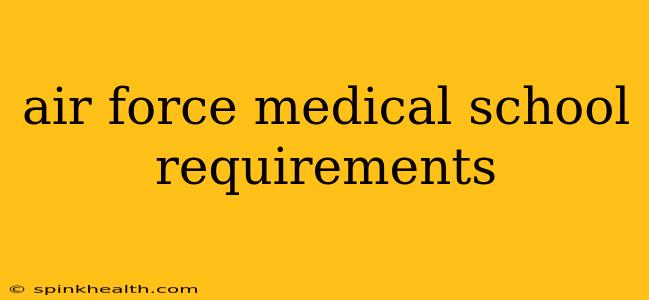The dream of becoming a physician, coupled with a desire to serve your country, often leads aspiring doctors to consider the Air Force. But the path to becoming an Air Force doctor is rigorous, demanding a unique blend of academic excellence, physical fitness, and unwavering commitment. This isn't just about getting into medical school; it's about navigating a complex system with specific requirements designed to ensure only the most qualified candidates serve. Let's delve into the journey.
What are the Basic Requirements for Air Force Medical School?
Before we dive into the specifics, understand that becoming an Air Force doctor isn't a straightforward application. It's a multi-step process. The foundation rests upon meeting the basic requirements for any medical school application, significantly amplified by the Air Force's additional demands. You'll need exceptional grades in challenging science courses, a stellar MCAT score, compelling letters of recommendation showcasing your character and capabilities, and a well-crafted personal statement that highlights your dedication to both medicine and military service. But that's just the beginning.
Do I Need to be Accepted to Medical School First?
This is a frequently asked question, and the answer is nuanced. While you don't need to be accepted to a civilian medical school before applying to the Air Force Health Professions Scholarship Program (HPSP), it's highly advantageous. The HPSP is the primary avenue for most aspiring Air Force doctors. This scholarship helps cover tuition, fees, and provides a monthly stipend. However, your application to the HPSP is evaluated before your medical school application, meaning your academic record, MCAT score, and overall profile need to be exceptionally strong to secure the scholarship and then gain acceptance to a medical school.
What is the Air Force Health Professions Scholarship Program (HPSP)?
The HPSP is the cornerstone of the Air Force's medical officer recruitment. Think of it as a comprehensive package: full tuition, a monthly stipend, and health insurance are just the beginning. Upon graduation, you'll serve a minimum of active-duty service obligation, providing medical care to Airmen, their families, and often, supporting broader national security goals. The HPSP provides structure, support, and a clear path toward your career. It's competitive, but successful applicants find it incredibly beneficial.
What are the Specific Requirements of the HPSP?
Aside from the standard medical school application requirements, the HPSP adds its own set of demands:
- US Citizenship: You must be a U.S. citizen.
- Background Check: Expect a thorough background check to assess your suitability for service.
- Medical Examination: You’ll undergo a comprehensive physical and mental health evaluation.
- Security Clearance: Securing a security clearance is a critical component of the process.
- Commitment to Service: You'll be signing up for a minimum number of years of active-duty service after medical school.
The specifics regarding the length of service are detailed on the official Air Force website.
What if I Already Have a Medical Degree?
If you've already obtained your medical degree, the pathway is different. You would apply directly to the Air Force for a commission as a physician. The process is still competitive, requiring a strong record and a suitable background check. The Air Force actively seeks experienced physicians in various specialties.
How Physically Fit Do I Need to Be?
The Air Force places a strong emphasis on physical fitness. While you don't need to be a marathon runner, you should be in good overall health, capable of meeting the Air Force's fitness standards. This involves regular physical activity and maintaining a healthy weight. Failing to meet these standards will disqualify you.
What Specialties Are in High Demand in the Air Force?
The Air Force's need for doctors is constantly evolving. While a broad range of specialties are valuable, those in high demand often include family medicine, emergency medicine, and psychiatry. However, it's always best to check the official Air Force website for the most up-to-date information on areas of greatest need.
Becoming an Air Force physician is a rewarding, yet challenging path. The requirements are rigorous, reflecting the responsibility and dedication needed to serve as a military doctor. However, for those with a passion for medicine and a strong commitment to service, the journey offers an unparalleled opportunity to combine fulfilling a professional ambition with serving your country. Remember to thoroughly research the HPSP program and consult official Air Force resources for the most current and accurate information.

